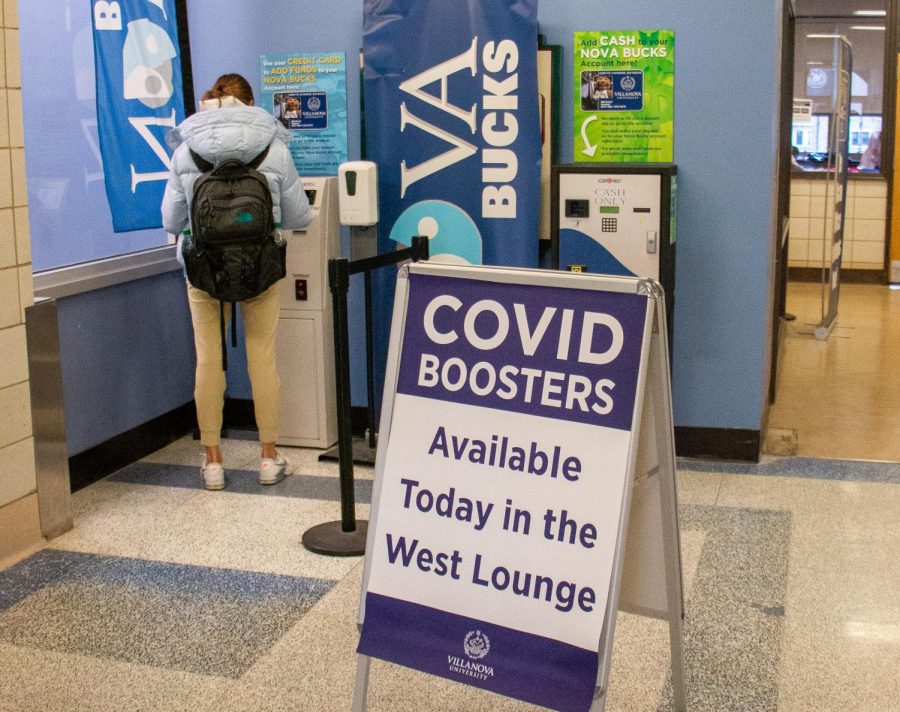Booster Requirement Brings Questions
Courtesy of Graydon Paul/Villanovan Photography
Booster shots have become a common requirement at higher education institutions this semester.
February 2, 2022
We are two years into the discovery of COVID-19 and its arrival in the United States. Since Mar. 13, 2020, our lives have transformed more than we could have imagined.
Education and work went remote, participating in our favorite group activities have become a challenge, we have lost loved ones and we are still not at the end of this.
In 2021, people who live in the United States were presented with three options: get vaccinated to protect themselves from contracting COVID-19, get vaccinated against COVID-19 to be eligible to work an in-person job or not get vaccinated and face the consequences. Yes, the last option is harsh, but that’s the reality.
If one does not get vaccinated, they run the risk of catching COVID-19 and dealing with severe symptoms that could result in hospitalization or death. One could also lose their job or never have one again (if they were previously laid off because of the pandemic). These are the options in the outside world, but what about for college students?
Villanova mandated the COVID-19 vaccine for all students (undergraduate and graduate), faculty members and staff in June 2021, even though the vaccine was released to the public only a few months prior. Any person who planned to attend or work in person needed to receive the vaccine by Aug. 1.
The University released this initial statement not long after the Center for Disease Control (CDC) reviewed the concern for myocarditis in young males between the ages of 18-25.
This left me in a tough spot as an undergraduate student who wanted more time for the vaccine to run its course through the larger American population to determine short and long-term side effects. I could not help but feel the anxiety this mandate brought, having to choose between my education or my health.
Fast-forward to now: there are multiple variants of the virus, and the CDC is recommending people who received their first two doses of the mRNA vaccines to get boosted with a third shot five months after the initial two to build even stronger protection against the virus’s variants. This is a lot to take in, all in under a year of the vaccine being released to the public.
There have been countless breakthrough infections among the fully vaccinated. Look at our COVID-19 Campus Dashboard as an example, with 1,167 positive cases since the beginning of January from students, faculty and staff.
Though the dashboard does not break down the percentage of those who are vaccinated and unvaccinated among the positive cases, the community was informed in mid-August of 2021 that 93% of the school’s population is vaccinated. Therefore, we can infer there is a large percentage of breakthrough infections among the Villanova community.
On Jan. 3 of 2022, just three weeks after encouraging members of the Villanova community to get boosted, the COVID-19 booster shot was mandated for the community, giving people until Jan. 31 to receive it. We remain unsure of the consequences for not complying.
Concerning students who did not partake in arrival testing, the University stated, “If this requirement is not met by this Friday, January 28, a hold will be placed on your academic records on Monday, January 31 which will prevent you from registering for classes, receiving grades or a transcript, or receiving a diploma.” With this new mandate for the booster, we can expect similar consequences for students.
The pandemic has been a trying time for people across the world. We understand that the governments are doing the best they can to keep us safe and healthy, just like the Villanova administration. However, there are still many things we do not know about COVID-19, the vaccines and the booster shots’ long-term effect.
Members of the Villanova community have expressed concerns about the vaccine and booster mandates, but the University has made its stance clear. Despite some community reservation, the University remains firm and encourages students to get vaccinated.










